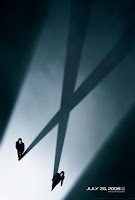And I bring up those issues in this review, written at the time of the film's release.
"That's not within your perview, Doctor"
And they're bickering. Just like old times.
When last time we left Fox and Dana (in the series finale) they were one happy family with baby William* squeezed between them for that kiss it took the entire series to come to.***** By that time nobody cared a rip about Mulder's UFO-abducted sister, the bees, black oil, ET's, super-soldiers, and the government collusion concerning...well, probably all of it. Everybody was so confused by that time, the only thing the audience knew for sure was that Mulder and Scully had to get together.Dr. Scully (Gillian Anderson) is recruited by the FBI to find Mulder (David Duchovny) ("What are you, my booking agent now?"), living by himself in a remote ranch-house presumably decorated by John Nash. He's been discredited, brought up "on charges" by the FBI (it's never explained--Hey, it's "The X-files!" They don't explain anything!**), but they still want his help.*** The Fed's have a lead from a psychic that they want Mulder to check out. He's a de-frocked Catholic priest and convicted pedophile who sees vague visions that might give clues to the missing Agent--or not. It does give an opportunity for the FBI's two biggest doubting Thomasi--he, of religion, she, of the supernatural—to lock horns and debate the whole movie. A psychic priest? They probably haven't had this much fun since they saw The Song of Bernadette!While Mulder mulls with Father Joe (Billy Connolly), Scully goes back to work as a surgeon at the cheery Our Lady of Sorrows Catholic Hospital, where her religion is tested with a patient who needs a radical stem-cell treatment, which gets the stink-eye from the father-in-charge, Father Ybarra. Scully threatens to take his objections to a higher authority. "I already have," says the priest.While Scully deals with her perviews, Mulder deals with his perv's view, while we get to watch the perps do their dirty work, if we could only figure out what that was.Creepy it is--you expect creepiness with "The X-Files," but there are none of those truly unsettling moments that trace an icy finger down your spine as the series could occassionally do. Nor are there any particularly good ideas that make you shake your head at the cleverness of the makers, those being "X-Files" veterans, Frank Spotnitz and Chris Carter. There's also a slight hint of homophobia, which might be attributable to its origins on Fox (20th Century Fox is the film's distributor).
I'd just like to see a question answered once in a while.
* A script complication dictated by Gillian Anderson's real-life pregnancy. Amanda Peet co-stars in this. She and Anderson must have compared stories of how a pregnancy can throw a TV series out of whack. Talk about yer complications.
** Consider yourself lucky to have the Credits! It's the only thing cut-and-dried in the movie!
*** If that doesn't make sense director Chris Carter defuses it somewhat at FBI headquarters by paying particular attention to portraits of Pres. Bush and FBI godfather J. Edgar Hoover. Oh, well...yeah...now it makes perfect sense!
**** And when you see it, be sure to watch all the ways through the credits for the answer to one question....


.jpg)














































